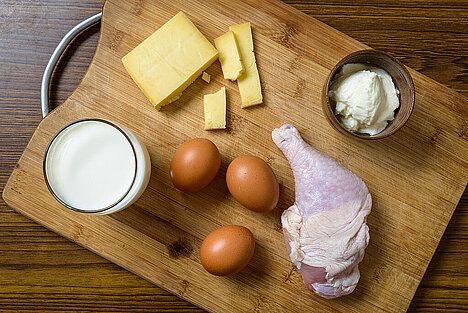Protein hydroylsate

What are protein hydrolysates?
Protein hydrolysates are artificially cleaved proteins. They are obtained by splitting ("hydrolyzing") animal or vegetable proteins either by adding acids under high temperatures and pressure or by using enzymes. The result is short amino acid chains, also known as peptides. These are easier to digest than whole proteins and can be absorbed more quickly by the body.
Protein hydrolysates can come from various sources, for example from meat, fish, milk, soy or cereals. The quality and composition of protein hydrolysates depends on the source, the production process and the degree of hydrolysis. Depending on this, protein hydrolysates can have different properties such as taste, smell, color, solubility or allergenicity.
What are the advantages of protein hydrolysate in dog nutrition?
Protein hydrolysates offer several advantages for the nutrition of dogs, especially dogs with special needs or problems. These include
- Better digestibility: Protein hydrolysate is easier to digest than whole protein as it is already partially broken down. This can be particularly beneficial for dogs with sensitive gastrointestinal tracts or digestive disorders.
- Reduced allergenicity: Protein hydrolysates can reduce the risk of food allergies or intolerances as the allergenic structures of the proteins are destroyed. This can be particularly beneficial for dogs with an existing allergy or tendency to allergies.
- Increased acceptance: Protein hydrolysates can improve the taste and smell of the food, as they often taste or smell more intense than whole proteins. This can be particularly beneficial for picky dogs or dogs with a lack of appetite.
What are the disadvantages of protein hydrolysates in dog food?
Protein hydrolysates also have some disadvantages in dog nutrition, especially when used in excessive amounts or as the sole source of protein. These include
- Unknown origin: Protein hydrolysates can come from different sources that are not always clearly declared. This can cause problems if you want to know where the protein comes from or if your dog prefers or tolerates a certain type of meat.
- Possible contaminants: Protein hydrolysates can contain contaminants that are formed during hydrolysis or come from the original source. These can be residues of antibiotics, hormones or pesticides, for example. This can affect the health of the dog.
- Lower biological value: Protein hydrolysates can have a lower biological value than complete proteins, i.e. they contain fewer essential amino acids or these are present in an unfavorable ratio. This can lead to a lack of certain amino acids that the dog needs for its health.
If you notice any signs of hypersensitivity or poisoning in your dog, you should see your vet immediately. We are not a substitute for a vet, but we try to be as accurate as possible. Every dog reacts differently and we recommend you get a second opinion or consult your vet if in doubt.
Stay healthy and take good care of your four-legged friend!😊